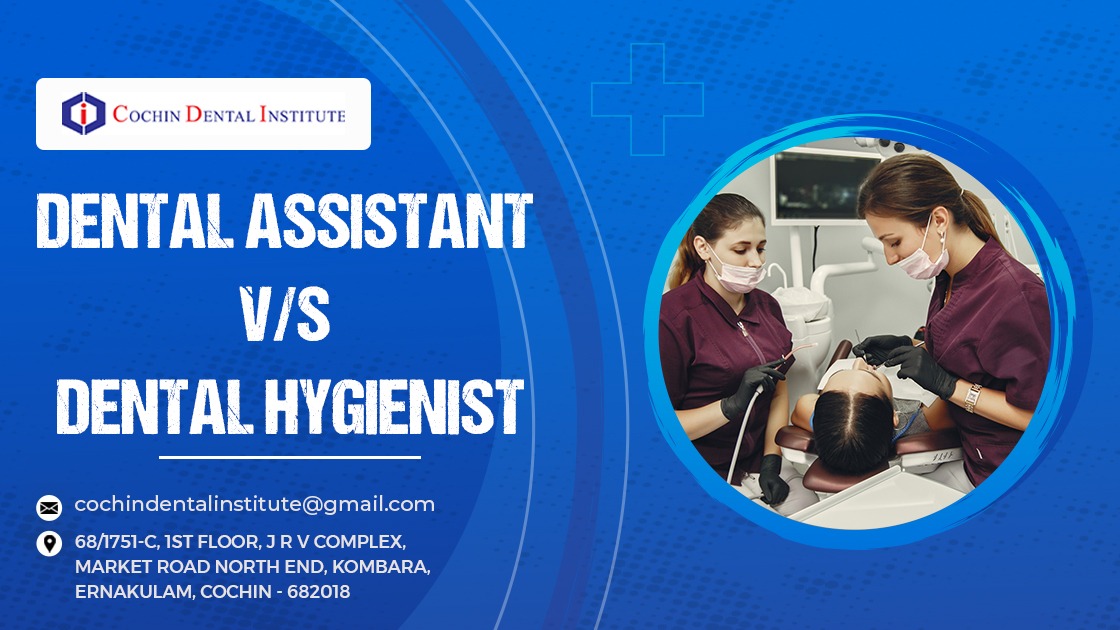When it comes to dental care, several professionals play crucial roles in ensuring patients’ oral health. Among these professionals, dental assistants and dental hygienists are often mentioned. While both are important dental team members, their roles and responsibilities differ significantly. We will explore the distinctions and similarities between dental assistants and dental hygienists, shedding light on their roles, education requirements, and scope of practice.
Roles and Responsibilities:
Dental assistants collaborate closely with dentists, offering chairside support throughout dental procedures. Their responsibilities include preparing treatment rooms, sterilizing instruments, taking patient X-rays, and ensuring the comfort of patients. They may also perform administrative tasks such as scheduling appointments and maintaining patient records.
Dental hygienists focus primarily on preventive dental care. They perform dental cleanings, remove plaque and tartar, conduct oral examinations, and educate patients on proper oral hygiene practices. They may also take X-rays, apply fluoride treatments, and provide recommendations for further dental treatment based on their assessments. Unlike dental assistants, dental hygienists often work independently, although they still collaborate with dentists to develop treatment plans.
Education and Licensing Requirements:
To become a dental assistant in India, the candidate must have acquired a primary education and should complete a diploma or certificate program from a recognized university. These programs usually last around one year and result in a certificate or diploma. Once you completed the course from a dental Institute, you can work in dental offices, public health clinics, educational institutions, research facilities, or even become oral health educators.
Becoming a dental hygienist also requires training from a recognized university. These programs also have a course duration of 1 or 2 years which covers various subjects such as dental anatomy, radiography, periodontics, and pharmacology.
Scope of Practice:
Dental assistants work under the supervision of dentists and perform supportive tasks to assist in dental procedures. They cannot diagnose dental conditions or provide direct patient care independently. The specific tasks they can perform vary by state, but they generally include preparing materials, taking impressions, and providing post-operative instructions. Dental assistants work closely with both dentists and dental hygienists to ensure the smooth operation of a dental practice.
Dental hygienists have a broader scope of practice compared to dental assistants. They can provide direct patient care, perform dental cleanings, administer local anaesthesia, and conduct periodontal assessments. Dental hygienists are also qualified to provide educational guidance on oral health and hygiene, conduct screenings for oral diseases, and apply preventive treatments such as fluoride or sealants. Their work focuses on promoting and maintaining good oral health. The path to becoming a dental assistant typically involves completing a dental assisting program or dental lab technician course, which can range from a few months to one year. Cochin Dental Institute provides dental lab technician courses in Kerala, and the career scope of the course is limitless including dental hygienist and dental assistant as well.
Both dental assistants and dental hygienists play vital roles in the dental field, but their responsibilities and educational paths differ significantly. Dental assistants primarily provide chairside assistance and perform administrative tasks, while dental hygienists focus on preventive care, patient education, and performing dental cleanings. Understanding the distinctions between these two professions is crucial for aspiring dental professionals and patients seeking dental care. By working collaboratively, dental assistants and dental hygienists contribute to delivering quality oral healthcare services to patients around the world.





